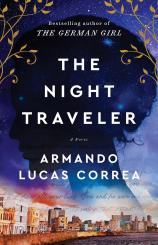The Night Traveler
Review
The Night Traveler
Internationally bestselling author Armando Lucas Correa returns with THE NIGHT TRAVELER. This time- and continent-spanning work of historical fiction traces the paths of four generations of women through war, revolution and reparations, beginning with the Nazi occupation of Germany and ending with the fall of the Berlin Wall.
In 1931 Berlin, beautiful Ally Keller knows nothing of the dangers she would face if the world found out about her Black German lover, the jazz musician Marcus. Although they take precautions to protect their lives and budding romance, Ally often dreams of risking it all for the right to hold hands with, or even kiss, her partner on the streets of the city she loves. But change is coming to Germany with the rise of the Führer, and although Marcus is German through and through, they know that his race puts him in danger from the deadly ideology of racial purity taking hold of Germany’s citizens. Soon after Ally discovers that she is pregnant, Nazi control is in full swing. By the time she gives birth to a beautiful, bright-eyed mixed-race daughter, Lilith, Marcus is gone, arrested under suspicion of rebellion, never to be seen by Ally or her daughter again.
Conscious of the risks that Lilith takes just by existing with her father’s skin tone and coarse hair, Ally and Lilith fall into a careful routine. During the day they read, with Lilith devouring every book of science, poetry and philosophy she can get her hands on. At night, when all German citizens look the same under the nonjudgmental moonlight, they walk the streets of the city that once felt like home but increasingly feels like a prison.
"...a sweeping, complex and ultimately cathartic work that is incredibly ambitious in scope yet lives up to every historic moment, impossible choice and singular character that Correa brings to life."
Rounding out their days is Herr Professor, their kindly older neighbor who, after devoting his life to education and progress, is struggling to watch as the written word, education and science are increasingly disputed, censored and finally forgotten. He becomes a sort of grandfather to Lilith, one who shelters and encourages her during the day while her mother writes poetry, dreams of Marcus and wonders what will happen when Lilith turns seven, the age that mixed-race children are measured, studied and tested for racial purity. The consequence of being deemed impure --- which Lilith, with her dark skin and hair, will certainly be labeled --- is sterilization. With the future of her daughter’s life and safety at guaranteed risk, Ally makes an impossible decision, one that changes the course of her matrilineal line forever.
In 1958 Havana, an adult Lilith has already witnessed more than her share of war, devastation and loss. The adoptive daughter of a kindly but depressed Jewish couple, Lilith has lived in Havana since she was a child, delighting in the musicality of the language and warmth of the Cuban people, even as her family is side-eyed for their German heritage. As she grows up, she makes forever friends with Martín Bernal, the son of a cabinet minister and friend to President Fulgencio Batista, commonly known as El Hombre, a self-taught peasant who rose to power through the military. Martín, a dreamer, has long maintained his goal of becoming a pilot. But as whispers of an American-backed rebellion begin to grow louder, Lilith starts to sense that the dangers she escaped in her childhood have found her once again.
The world enters and concludes a World War that draws Germany closer than ever before, but no amount of rebuilding and repatriating can undo the damage that has been done to Lilith or her adoptive parents. Just as her engagement to Martín is announced, tragedy strikes her family again, soon followed by her pregnancy, the birth of her daughter, Nadine, and Martín’s own capture and imprisonment as Fidel Castro rises to power. Once again, a mother must make an impossible choice that will separate her from her daughter forever. But even in this hardship, there is a poetic beauty as Correa makes clear the journey of forgiveness that Lilith has begun. For the first time, she understands the choice her mother made and is grateful for it. She only hopes that Nadine will feel the same way one day.
Nadine’s journey to salvation lands her in Queens, New York, the adoptive daughter of a pair of Catholics who house, dress, feed and even spoil her, but never show her the warmth she knows has been missing since her birth, perhaps even longer. A surprise visitor to their New York apartment sets Nadine and her adoptive parents on a course to Berlin, where her mother, Irma, is forced to reckon with the choices she made at the height of the Nazi regime. Nadine has always believed that the past is just a story, something that doesn’t have to touch, change or hurt you as long as you ignore it. But when she estranges herself from her parents and becomes a mother to bright, poetic Luna, she embarks on a path of rediscovery and reclamation, rescuing her ancestors from the past through the power of education and identification.
While the horrors of what happened in Nazi Germany are widely known and condemned, neither Nadine nor Luna are prepared for what they discover about their grandmother and great-grandmother, Ally. Or how a massive betrayal put Ally, her daughter, granddaughter and great-granddaughter in the crosshairs of some of history’s biggest and most traumatic events: the Nazi concentration camps, the Cuban Revolution and the fall of the Berlin Wall.
The bloodline of brilliant, courageous women whom Correa profiles in THE NIGHT TRAVELER is one of beauty, grace and complexity. From Ally all the way down to Luna, each carries the weight of generational trauma, prejudice and survivor’s guilt. Yet each is able to carve out a life for herself, bring a new daughter into the world, and face history’s latest trauma, all while reckoning with her own past. As Nazism destroys the family line and Communism robs them of their hard-fought lives, each woman descended from Ally must fight not only to work through the pain of abandonment, desertion and loss, but to find a reason to forgive, hope and trust again. These are stubborn, unique and fully fleshed-out women, though each carries the echoes of her mother, grandmother and so on. Readers will delight in finding the connecting lines between them: skin tones, interests and temperaments that skip generations but never waver from Ally’s matrilineal line.
Although none of the women are fortunate enough to know their mothers, each is touched at one point or another by a poem written by Ally, “The Night Traveler,” the work from which the novel draws its title. A testament to the power of art, historical record and legacy, THE NIGHT TRAVELER carries much of the same weight as this treasured poem. It’s a sweeping, complex and ultimately cathartic work that is incredibly ambitious in scope yet lives up to every historic moment, impossible choice and singular character that Correa brings to life.
A tidbit for readers of Correa’s previous novels: Although independent from THE GERMAN GIRL and THE DAUGHTER’S TALE, THE NIGHT TRAVELER is connected to the others through the MS St. Louis, the transatlantic ocean liner that left the port of Hamburg in 1939 carrying more than 900 passengers, the majority of which --- like Lilith and her adoptive parents --- were German Jewish refugees. While it is not necessary to have read Correa’s earlier works to enjoy his latest, I suspect that few readers will bypass the opportunity to marvel at his atmospheric prose, generational symmetry and strong, resilient female characters by delving into his backlist.
Reviewed by Rebecca Munro on January 13, 2023
The Night Traveler
- Publication Date: November 7, 2023
- Genres: Fiction, Historical Fiction, Women's Fiction
- Paperback: 368 pages
- Publisher: Washington Square Press
- ISBN-10: 1501187996
- ISBN-13: 9781501187995




